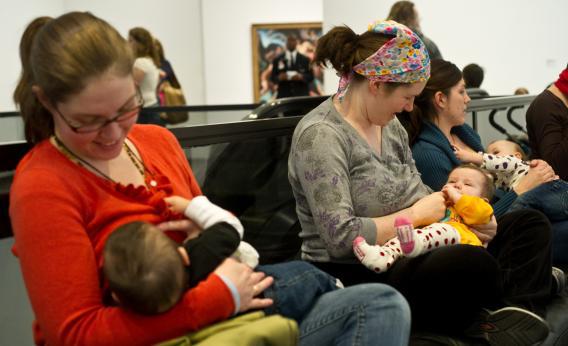Raise a (nonalcoholic, noncaffeinated) toast! This is World Breastfeeding Week—in Canada, at least, and in a handful of U.S. cities. The rest of the world celebrates with the World Health Organization, which holds its own official breastfeeding week in August, but some apparently prefer to fete lactation in the 40th week of the year, to honor the length of a pregnancy. Breastfeeding is motherhood to a certain group of believers, and they’re commemorating this week with plenty of public displays of lactation. In St. Louis, one group is encouraging women to march down a city block wearing “your favorite breastfeeding t-shirt. In North Carolina, a group of women planned a “synchronized latch.” In Canada, towns competed to see who could set a record for the most babies breastfeeding at once.
This is why it was hard for me to write a novel about the breastfeeding wars. Every time I’d think of something outrageous—say, a group of breastfeeding advocates called the BOOBs—someone in the real world would one-up me. As I was trying to mine my feeble imagination, Gisele Bundchen was telling Elle magazine that breastfeeding should be required by international law. A shop in England started selling breast-milk ice cream. And someone invented an infant’s hat that looks like a naked breast. (I finally dreamed up something that hasn’t happened yet: a nursing mother catapulted to Joe the Plumber status after her wardrobe malfunction becomes an election-year controversy.)
Meanwhile, as I wrote, the backlash grew. Countless mothers around me—largely college-educated, professional women who had researched infant health meticulously—were feeling beleaguered by pressure to breastfeed exclusively. We read up on “nipple confusion” and swore off broccoli, all while desperately hoping some lactivist would acknowledge what we knew in our guts: that if we were keeping our babies safe, clean, and secure, a little formula wouldn’t kill them, as Slate’s Hanna Rosin pointed out in her controversial Atlantic piece a few years ago.
This is not, in fact, the case everywhere in the world. In places where sanitation is less reliable and intestinal diseases are more rampant, breastfeeding really can reduce infant mortality. And the lactivists’ work isn’t done in the United States, where, among black and Latina women and all women of lower income, lack of awareness abounds, and the social pressure to avoid breastfeeding can still be overwhelming. For women conditioned to connect formula to beauty—like the ones portrayed in Black Sheep’s “Similak Child” it’s doubtful that a synchronized latch across town is going to cause a conversion.
In fairness, some World Breastfeeding Week activities are geared toward spreading the word to precisely those people. The La Leche League of Greater St. Louis is holding a daylong seminar at the zoo, aimed at women in WIC. But that’s not the sort of program that springs to mind when people talk about lactivists. To much of the population that’s actually listening—fairly or not—breastfeeding activists are cult members, purveyors of guilt.
Maybe guilt really was necessary, in the beginning, to convince an entire nation of women do something that starts off so hard. But these days, TV anchors talk openly about pumping. Angelina Jolie breastfed on the cover of W, and Posh Spice had her implants removed so she could nurse her daughter. So when lactivists make the news, it’s usually because they’re marching alongside the converted, or protesting the latest celebrity to balk at public breastfeeding, or wielding pictures of their breasts as weapons against the prurient.
It’s hard to argue against their cause—especially if the alternative is forcing nursing mothers to stay home, lest they offend someone. But it seems as if the common ground is obvious here. More lactation rooms. Good coverups. Next issue?
There are plenty of pressing issues for new mothers of all persuasions, such as better maternity and sick-leave standards. And if lactivists could join with mainstream moms—without the pugilistic rhetoric and mutual distrust—they could make a powerful force. But that sort of collaboration has no place in the mommy wars. It’s easier to glare at each other across the park. And then, for good measure, buy a T-shirt. Maybe two.
